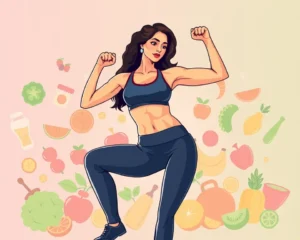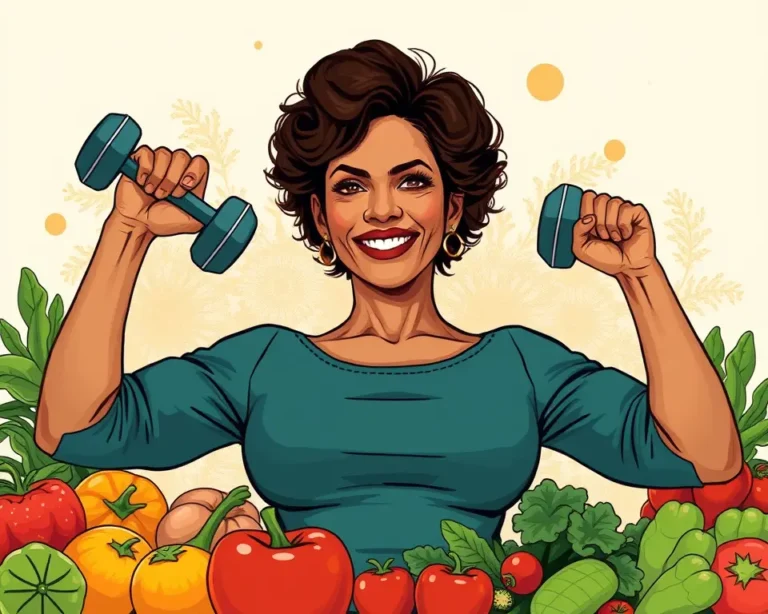At 58, Halle Berry continues to redefine aging, showcasing a vibrant and toned physique that inspires women worldwide. As she navigates menopause, Berry has openly shared her evolving fitness and diet strategies, emphasizing the importance of adapting to the body’s changing needs. Her approach focuses on ditching traditional cardio for heavy weightlifting and adjusting her diet to include moderate carbohydrates, proving that a holistic and personalized wellness plan can lead to remarkable results. This article delves into Halle Berry’s menopause fitness and nutrition secrets, providing actionable insights for women over 50 to stay strong, healthy, and energized.
Understanding the Impact of Menopause on Fitness and Nutrition
Menopause, typically occurring between the ages of 48 and 53, marks a significant transition in a woman’s life. This phase is characterized by a decline in estrogen levels, leading to various physiological changes that affect metabolism, muscle mass, bone density, and overall energy levels. Recognizing these changes is crucial for tailoring a fitness and nutrition plan that supports women’s health during and after menopause.
The Hormonal Shift: How Estrogen Decline Affects Your Body
The decrease in estrogen during menopause has far-reaching effects:
- Muscle Mass Reduction: Lower estrogen levels can accelerate muscle loss, a condition known as sarcopenia. This loss can impact strength, mobility, and metabolic rate.
- Bone Density Loss: Estrogen plays a vital role in maintaining bone density. Its decline increases the risk of osteoporosis, making bones more brittle and prone to fractures.
- Metabolic Changes: Menopause can slow down metabolism, making it easier to gain weight, particularly around the abdomen.
- Increased Inflammation: Hormonal changes can lead to increased inflammation, potentially exacerbating joint pain and other health issues.
- Cognitive Changes: Many women experience “menopause brain fog,” characterized by difficulty concentrating and memory lapses.
Why Traditional Fitness Approaches May Fall Short
Traditional fitness routines that heavily rely on cardio may not be the most effective strategy for women navigating menopause. High-intensity cardio can increase cortisol levels, which, when chronically elevated, can lead to:
- Fat Storage: Especially around the midsection.
- Sleep Disturbances: Affecting the quality and duration of sleep.
- Mood Swings: Worsening perimenopausal symptoms like anxiety and fatigue.
Therefore, it’s essential to shift the focus towards exercises and dietary adjustments that counteract these effects, promoting overall well-being and vitality.
Halle Berry’s No-Cardio, Heavy-Weight Approach to Fitness
Halle Berry’s fitness philosophy has evolved to prioritize strength training over cardio. This shift aligns with the understanding that building and maintaining muscle mass is crucial for women over 50.
The Power of Strength Training: Building and Maintaining Muscle
Strength training offers numerous benefits for menopausal women:
- Preserves Muscle Mass: Resistance exercise helps combat sarcopenia, maintaining strength and mobility.
- Boosts Metabolism: Increased muscle mass elevates the resting metabolic rate, aiding in weight management.
- Strengthens Bones: Weightlifting stimulates bone growth, reducing the risk of osteoporosis.
- Improves Balance and Coordination: Enhancing stability and preventing falls.
- Elevates Mood: Exercise releases endorphins, which have mood-boosting effects and can alleviate symptoms of depression and anxiety.
Berry emphasizes lifting heavier weights than she ever has before, typically two days a week. She focuses on maintaining existing lean muscle, which she notes is critical at this stage of life.
Sample Strength Training Routine for Women Over 50
Here’s a sample strength training routine inspired by Halle Berry’s approach, designed for women over 50:
Warm-up (5-10 minutes):
- Light cardio, such as walking or marching in place
- Dynamic stretching: arm circles, leg swings, torso twists
Workout (30-45 minutes):
- Squats: 3 sets of 10-12 repetitions
- Stand with feet hip-width apart, lower your hips as if sitting in a chair, keeping knees behind toes.
- Dumbbell Rows: 3 sets of 10-12 repetitions per arm
- Bend at the hips, keeping your back straight, and pull dumbbells towards your chest.
- Push-Ups (Modified on knees if needed): 3 sets of as many repetitions as possible (AMRAP)
- Start in a plank position, lower your chest towards the floor, and push back up.
- Overhead Press: 3 sets of 10-12 repetitions
- Stand with feet hip-width apart, lift dumbbells overhead, and lower them back down with control.
- Lunges: 3 sets of 10-12 repetitions per leg
- Step forward with one leg, lower your body until both knees are bent at 90 degrees, and push back up.
- Plank: 3 sets, holding for 30-60 seconds
- Maintain a straight line from head to heels, engaging your core.
Cool-down (5-10 minutes):
- Static stretching: hold each stretch for 30 seconds, focusing on major muscle groups worked during the workout.
Important Considerations for Strength Training
- Consult with a healthcare professional: Before starting any new exercise program, consult with your doctor, especially if you have underlying health conditions.
- Proper Form: Focus on maintaining proper form to prevent injuries. If you’re unsure about your technique, consider working with a certified personal trainer.
- Progressive Overload: Gradually increase the weight, repetitions, or sets as you get stronger.
- Listen to Your Body: Rest and recover when needed. Don’t push yourself too hard, especially when starting.
Halle Berry’s Diet Secrets: Balancing Carbs, Protein, and Essential Nutrients
In addition to her strength-focused workout routine, Halle Berry emphasizes the importance of a balanced diet tailored to her body’s needs during menopause. Once a proponent of the keto diet for managing diabetes, Berry now incorporates moderate carbohydrates for energy.
The Role of Macronutrients: Carbs, Protein, and Fats
- Carbohydrates: Carbs provide the body with energy. Opt for complex carbohydrates like whole grains, fruits, and vegetables over simple sugars and processed foods.
- Protein: Protein is essential for building and repairing muscle tissue, as well as supporting bone health. Good sources include lean meats, poultry, fish, eggs, legumes, and tofu.
- Fats: Healthy fats are crucial for hormone production, brain function, and overall health. Choose sources like avocados, nuts, seeds, olive oil, and fatty fish.
Key Dietary Adjustments for Menopause
- Increase Protein Intake: Aim for 1 to 2 grams of protein per kilogram of body weight daily to help preserve muscle mass.
- Moderate Carbohydrate Consumption: Incorporate complex carbs to fuel your body and manage energy levels.
- Focus on Fiber: Fiber helps regulate blood sugar, promotes digestive health, and can aid in weight management. Good sources include fruits, vegetables, whole grains, and legumes.
- Stay Hydrated: Drink plenty of water throughout the day to support overall health and combat menopausal symptoms like hot flashes.
Halle Berry’s Vitamin Regimen
Berry has revealed that she takes around 16 vitamins daily, emphasizing the importance of supplementation. While the specific vitamins she takes are not fully detailed, key nutrients to consider for women over 50 include:
- Calcium: Essential for bone health. Women over 50 need about 1200 mg of calcium daily.
- Vitamin D: Helps the body absorb calcium and supports immune function. Aim for 800-1000 IU of vitamin D daily.
- Vitamin B12: Important for nerve function and red blood cell production.
- Omega-3 Fatty Acids: Support heart health, brain function, and reduce inflammation.
- Magnesium: Plays a role in bone health, muscle function, and energy production.
It’s important to consult with a healthcare provider before starting any new supplement regimen to determine the appropriate dosages and ensure there are no interactions with existing medications.
Sample Meal Plan for Women Over 50
Here is a sample meal plan incorporating the principles of Halle Berry’s diet and the nutritional needs of women over 50:
Breakfast:
- Oatmeal with berries and nuts, topped with a scoop of protein powder
- Greek yogurt with fruit and a sprinkle of chia seeds
Lunch:
- Grilled chicken salad with mixed greens, avocado, and a variety of vegetables
- Lentil soup with a whole-grain roll
Dinner:
- Baked salmon with roasted vegetables (broccoli, sweet potatoes, and bell peppers)
- Tofu stir-fry with brown rice and plenty of colorful vegetables
Snacks:
- A handful of almonds or walnuts
- Apple slices with peanut butter
- Hard-boiled eggs
- Cottage cheese with pineapple
Embracing a Holistic Approach to Menopause
Halle Berry’s journey through menopause highlights the significance of adopting a holistic approach that encompasses fitness, nutrition, and overall well-being. By understanding the physiological changes that occur during this transition and tailoring a personalized plan, women can thrive and maintain their vitality.
Additional Tips for Managing Menopause Symptoms
- Regular Exercise: In addition to strength training, incorporate activities like walking, swimming, or yoga to promote cardiovascular health and flexibility.
- Stress Management: Practice relaxation techniques such as meditation, deep breathing exercises, or spending time in nature.
- Adequate Sleep: Aim for 7-8 hours of quality sleep per night.
- Limit Alcohol and Caffeine: These substances can exacerbate menopausal symptoms like hot flashes and sleep disturbances.
- Stay Socially Active: Connect with friends, family, or support groups to combat feelings of isolation and promote emotional well-being.
Halle Berry’s Respin: Empowering Women Through Menopause
Halle Berry has launched her women’s health company, Respin, dedicated to menopause care. Respin offers a holistic approach, leveraging AI to support women through this phase with the latest information on diet, exercise, and hormone replacement therapy. The platform also fosters a supportive community, providing a space for women to connect and share their experiences.
Conclusion: Re-Defining Aging with Strength and Knowledge
Halle Berry’s approach to fitness and nutrition during menopause serves as an inspiring example for women over 50. By prioritizing strength training, embracing a balanced diet, and staying informed about the body’s changing needs, women can navigate this transition with confidence and vitality. As Berry herself stated, “It’s not time to sit down. It’s time to reinvent.” With the right knowledge and strategies, women can embrace their “beautiful, glorious second act” and continue to thrive.







